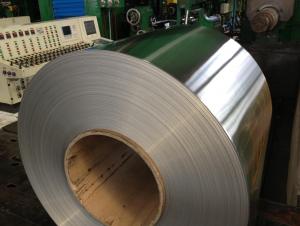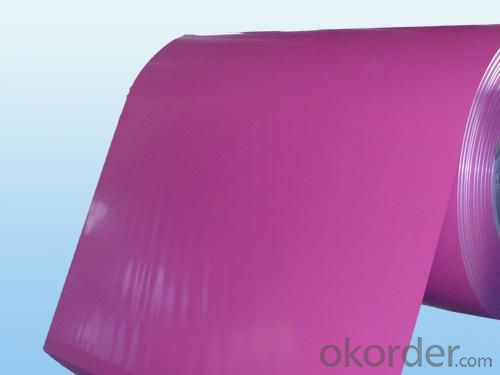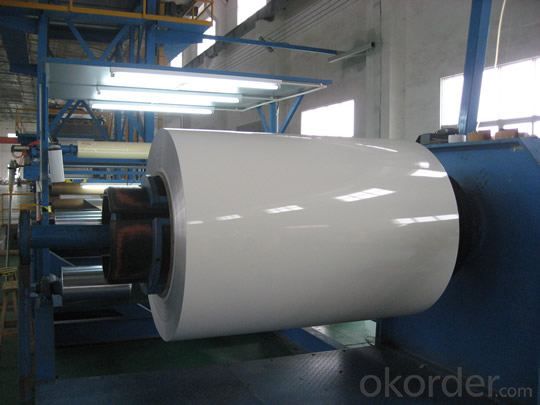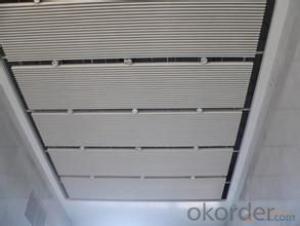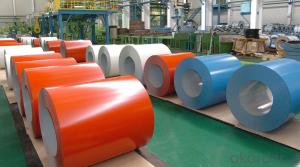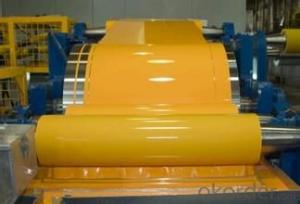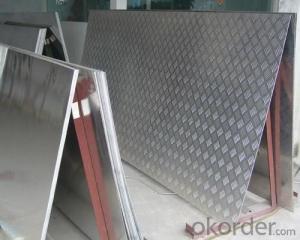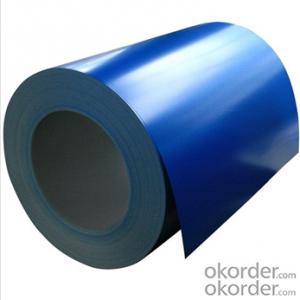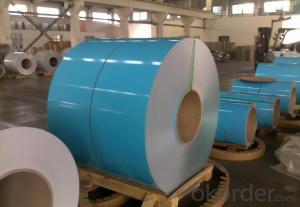1100 Aluminum Coils for Sale - Cold Rolling Aluminum Coils for Color Prepainting
- Loading Port:
- Shanghai
- Payment Terms:
- TT or LC
- Min Order Qty:
- 5 m.t.
- Supply Capability:
- 5000 m.t./month
OKorder Service Pledge
OKorder Financial Service
You Might Also Like
1.Structure of Cold Rolling Aluminium Coils for Color Prepainting
Cold Rolling Aluminium Coils for Color Prepainting is one semi-finished aluminium material. This strip can be rolled down to aluminium coil,sheet,circle ect. The alloy AA1050 is widly used in building, industry ect. Its weight is much lower than steel. So many customers choosed aluminium material instead of steel.
2. Main features of the product
a.Competitive price---We have our own mills and can produce mill finished aluminium coils, so we can control the production cost better.
b.Professional after-sale service---We have more than 15 years exportation experience and you need not worry about the exporation problems.
c.Fast delivery time---We can control the delivery time within 35 days.
3.Image
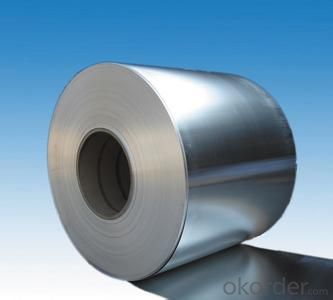
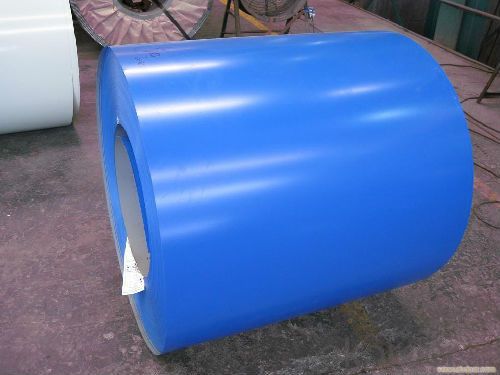
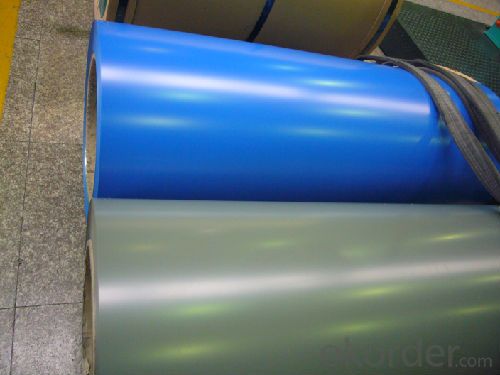
4. Products Specification
| Alloy | Temper | Color Coating | Coating Thickness | Weight |
| AA1050 | H14 | Polyester | 22-25 microns | 2 tons |
5. FAQ
What is the quality standard?
---Usually our standard is GB3880-2006
What is the largest width?
---It is 2300mm
What is the MOQ?
---Usually we can accept 80 tons.
- Q: Are aluminum coils compatible with different welding methods?
- Yes, aluminum coils are compatible with different welding methods such as MIG (Metal Inert Gas) welding, TIG (Tungsten Inert Gas) welding, and even resistance spot welding. These methods can be used to join aluminum coils effectively and efficiently.
- Q: Is it possible to join steel coils using arc welding or gas welding techniques?
- <p>Yes, steel coils can be welded together using both arc welding and gas welding methods. Arc welding, specifically processes like Shielded Metal Arc Welding (SMAW) and Gas Metal Arc Welding (GMAW), is commonly used for joining steel due to its strength and versatility. Gas welding, which uses a fuel gas and an oxygen mixture to produce a flame, is also suitable for steel welding, although it may be less common in industrial settings due to the higher heat input and potential for distortion. Proper techniques and equipment are essential to ensure a strong, durable weld and to avoid defects such as cracking or warping.</p>
- Q: How are aluminum coils protected during shipping?
- To guarantee the safety of aluminum coils during shipping and prevent any potential harm, various methods are employed. One frequently used approach involves the utilization of protective packaging materials, such as bubble wrap, foam, or corrugated cardboard, which are employed to envelop the coils. This wrapping creates a cushioning effect that absorbs any impact or vibration that may occur during transportation. In addition to these protective packaging materials, aluminum coils are often placed within robust shipping containers or crates. The design of these containers aims to provide enhanced security and stability during transit, thereby minimizing the risk of the coils being jostled or bumped. Furthermore, to maintain the coils' integrity and decrease the possibility of damage caused by friction with other objects, strapping or banding is frequently employed to secure the coils and prevent any shifting or movement during transportation. Moreover, shipping companies may also employ air-bag systems or dunnage bags to fill any empty spaces within the shipping container. This additional measure further reduces movement and adds an extra layer of protection for the coils. In summary, the protection of aluminum coils during shipping involves a combination of packaging materials, secure containers, and preventive measures to ensure their safe arrival at their intended destination.
- Q: What is the typical fatigue strength of aluminum coils?
- The typical fatigue strength of aluminum coils varies depending on various factors such as the alloy used, the manufacturing process, and the specific application. However, in general, aluminum coils have relatively high fatigue strength compared to other materials, making them suitable for applications where repeated cyclic loading is involved.
- Q: How do aluminum coils contribute to sustainable manufacturing practices?
- The numerous environmental and economic benefits of aluminum coils make them crucial for promoting sustainable manufacturing practices. To start, aluminum is an incredibly recyclable material, with almost 75% of all aluminum ever produced still in use today. This means that aluminum coils can be recycled and reused multiple times without losing their quality or performance. Unlike producing new aluminum, recycling aluminum requires only a fraction of the energy, resulting in significant energy savings and reduced greenhouse gas emissions. Furthermore, the lightweight nature of aluminum coils contributes to energy efficiency in transportation and reduces fuel consumption during shipping. This characteristic allows for more efficient use of resources, as less material is needed to achieve the same strength and durability compared to other metals. Consequently, this not only reduces the overall weight of products but also lowers the energy required for their fabrication and transportation. Moreover, the excellent corrosion resistance of aluminum coils extends their lifespan and reduces the need for frequent replacement. This factor not only saves resources but also reduces waste generation and associated environmental impacts. Additionally, aluminum coils are non-toxic and do not release harmful substances into the environment, making them a safe and sustainable choice for various manufacturing applications. In terms of economic benefits, aluminum coils contribute to sustainable manufacturing practices by offering cost savings throughout their lifecycle. The recyclability of aluminum reduces the need for raw material extraction, thereby lowering operational costs and dependence on virgin resources. Additionally, the lightweight nature of aluminum coils allows for more efficient use of energy and resources, resulting in reduced manufacturing and transportation costs. In conclusion, aluminum coils are essential for promoting sustainable manufacturing practices due to their recyclability, lightweight nature, corrosion resistance, non-toxicity, and cost-saving benefits. By integrating aluminum coils into manufacturing processes, companies can reduce their environmental footprint, conserve resources, promote energy efficiency, and contribute to a more sustainable and greener future.
- Q: We have all heard the Us saying aluminum and their euro counterparts saying aluminium. I assumed this was just a small difference in culture or location. But, while reading my chemistry book (Chemistry the Central Science 12th) i came across a section saying: Cations formed from nonmetal atoms have names that end in -ium: NH4+ ammonIUM ion, H3O+ hydronIUM ion. So, i have came up with a hypothesis, could it be possible that when the periodic table was coming together, the aluminium was changed to aluminum to allow the rules to work? Thus making aluminum the correct spelling? Give me your thoughts.
- There have been some disputes over element naming. Aluminium is just one of the many. Davy originally named the metal aluminum, after the alum series of minerals. However, people complained about the sound of the word and suggested aluminium instead, to conform with the -ium suffix of many metals (though not all, such as platinum and molybdenum). In 19th-century US, aluminium (with the extra i) was the most used spelling. However, the Hall process of extracting the metal from its ores (an American invention) used aluminum as the spelling, meaning the preferred spelling state-side became aluminum with the omitted letter i. IUPAC states that aluminium is the preferred spelling, but states aluminum as an acceptable variant.
- Q: I live around Minneapolis, MN. Is there a place that you can recycle crushed aluminum cans for money around here?
- there are lots of benefits you must google it
- Q: Can aluminum coils be used in the production of aluminum doors?
- Yes, aluminum coils can be used in the production of aluminum doors. Aluminum coils are commonly used as the raw material in the manufacturing process of aluminum doors. They are rolled into sheets and then shaped and fabricated according to the desired design and specifications of the door.
- Q: How do aluminum coils compare to iron coils in terms of weight?
- In terms of weight, aluminum coils possess a significant advantage over iron coils due to their lower density. This results in aluminum coils weighing less for the same volume. With aluminum weighing approximately one-third of iron, it becomes a substantially lighter material when utilized in coil applications. This advantage in weight proves particularly advantageous in industries prioritizing weight reduction, such as automotive and aerospace, as it enhances fuel efficiency and overall performance.
- Q: How are aluminum coils tested for quality and performance?
- Aluminum coils are tested for quality and performance through a series of rigorous inspection processes. These tests aim to assess the mechanical, chemical, and physical properties of the coils to ensure they meet the required standards. One common test conducted is the visual inspection, where trained technicians examine the surface of the aluminum coils for any visible defects such as scratches, dents, or irregularities in shape. This step is crucial as it helps identify any cosmetic flaws that may affect the overall performance and quality of the coils. Another important test is the dimensional inspection, which involves measuring the thickness, width, and length of the coils to ensure they meet the specified tolerances. This test is critical as it helps guarantee the coils will fit properly in their intended applications and perform optimally. To assess the mechanical properties, various mechanical tests are conducted. One such test is the tensile strength test, which measures the maximum amount of stress a coil can withstand before breaking. This test helps determine the strength and durability of the coils under different operating conditions. Additionally, the hardness test is performed to evaluate the resistance of the coils to indentation or scratching. This test provides insights into the coil's ability to withstand wear and tear, ensuring its longevity. Chemical analysis is another vital aspect of quality testing. The chemical composition of the aluminum coils is examined to ensure it meets the required standards and does not contain any impurities or elements that may compromise the performance or safety of the coils. Furthermore, to assess the thermal properties of the coils, thermal conductivity tests are conducted. These tests measure the coil's ability to conduct heat efficiently, ensuring that it can effectively dissipate heat in applications where it is used. In addition to these tests, other performance evaluations may be conducted depending on the specific application of the aluminum coils. This could include corrosion resistance tests, fatigue tests, or even electrical conductivity tests. These evaluations help determine the coil's ability to perform under different conditions and ensure its reliability and longevity. By subjecting aluminum coils to these comprehensive quality and performance tests, manufacturers can ensure that only the highest quality coils are delivered to customers, meeting their expectations and standards.
Send your message to us
1100 Aluminum Coils for Sale - Cold Rolling Aluminum Coils for Color Prepainting
- Loading Port:
- Shanghai
- Payment Terms:
- TT or LC
- Min Order Qty:
- 5 m.t.
- Supply Capability:
- 5000 m.t./month
OKorder Service Pledge
OKorder Financial Service
Similar products
Hot products
Hot Searches
Related keywords

